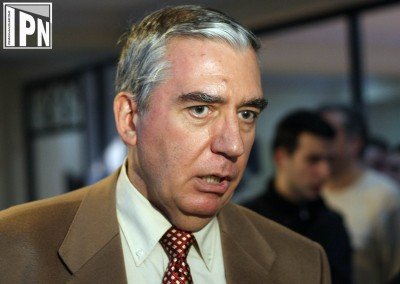Giorgi Khutsishvili Passes Away
10 October, 2013
Georgian Journal frequently approached Khutsishvili for his opinions on Georgian political life. We express condolence to his family members and his team in ICCN on the tragic loss.
The main page of the site of ICCN bears the portrait of Georgian expert Giorgi Khutsishvili. ICCN expresses “deep sorrow regarding the unexpected death of its founder and unchallenged director, Professor George Khutsishvili and communicates condolences to his family - wife, Nino Tsikhistavi -Khutsishvili and daughter, Victoria -Sophia Khutsishvili, his friends and relatives. We will cherish happy memories of this outstanding professional and noble person,” it reads.
ICCN was founded in 1994 as independent research and training institution. “ICCN was established with the aim of building peace and accord in the divided post-totalitarian society, placing its main emphasis on conflict prevention and resolution in the Caucasus region with special focus on Georgia.”
We offer the extract from the interview of Georgian Journal with Giorgi Khutsishvili as a token of his professionalism. He talks about developing of cohabitation in Georgia.
Georgian journal: What do you think about the progress of Georgian cohabitation and what role do the oppositional parties outside the Parliament have?
Giorgi Khutsishvili: In 2012, in the period prior to the parliamentary elections, there were opposed poles in Georgian politics: the governing power of National Movement and the opposition of Georgian Dream. Georgian Dream collected those parties who, in the opinion of Bidzina Ivanishvili, could become the members of his coalition. Of course, many parties remained outside the coalition and parliamentary elections. There were forces that lacked power and did not enjoy much support of the public but they could nevertheless play a major political role. However, while choosing political parties, Bidzina Ivanishvili made estimation whether those parties would be appropriate for the coalition or not; for example –the parties that were notorious for their affection for Russia, such as the parties of Burjanadze and Kukava, couldn’t get in. He tried to avoid conjectures on this topic during the tense pre-election period. It’s my personal opinion. I have to say that not all the parties that were united in coalition enjoyed high rating and popularity. He chose mainly two parties: Republicans and Democrats and then added the Forum. But after winning the elections and creating cohabitation in politics, there is a need to think about future development of events: will cohabitation retain its power after presidential elections, or will National Movement disappear from the political scene? In that case majority will stay without opposition. It’s not a productive layout: ruling party needs opposition and in case of absence of such, it should be created.



